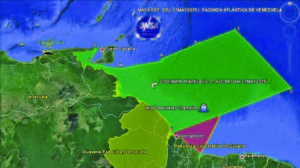 …after Venezuela says it will not participate in border controversy case
…after Venezuela says it will not participate in border controversy case
Guyana will ask the International Court of Justice (ICJ) to make a ruling on the border controversy with Venezuela in its favour after the Venezuelan Government announced it would not participate in the case.
According to Guyana’s Ministry of Foreign Affairs, even if Venezuela persists in its refusal to participate, the rules provide for the Court to proceed to a final judgment that is legally binding on both the participating and nonparticipating parties.
In a statement issued on Monday, the Ministry noted that under Article 53 of the Statute of the Court, “whenever one of the parties does not appear before the Court, or fails to defend its case, the other Party may call upon the Court to decide in favour of its claim”.
Guyana, the statement explains, intends to proceed in accordance with the said Article.
The Venezuelan Government issued an official statement on Monday outlining its decision not to participate in the United Nations Secretary General-chosen procedure regarding its claim over the Essequibo region.
This announcement followed several months after the decision was made by UN Secretary General Antonio Guterres, to refer the matter to the ICJ as a means of resolving the ongoing controversy.
During a meeting with the ICJ and a Venezuelan delegation headed by the country’s Foreign Affairs Minister, Jorge Montserrat the position was made known to ICJ President Abdulqawi Ahmed Yusuf.
“The Venezuelan delegation has informed the President of the court, through a letter signed by the President of the Republic, Nicolás Maduro Moros, of its sovereign decision not to participate in the procedure that Guyana intends to initiate, since the Court manifestly lacks jurisdiction over an action unilaterally proposed by the neighbouring country, which does not have the consent of Venezuela,” the statement said.
Justice Yusuf had invited the legal teams representing Guyana and Venezuela in the border controversy case, to attend a meeting with him in The Hague, Netherlands. The purpose of the meeting was to fix the schedule for the filing of the written pleadings in the border controversy case between the two South American neighbours. Such a meeting is part of the Court’s normal procedure following the filing of a case.
On March 29, Guyana filed an application requesting the World Court to confirm the legal validity and binding effect of the 1899 Arbitral Award regarding its boundary with Venezuela.
This application follows a decision by the UN Secretary General earlier this year in choosing the ICJ as the next means of resolving the controversy that arose as a result of the Venezuelan contention that the Arbitral Award of 1899 about the frontier between British Guiana and Venezuela was null and void.
According to Guyana’s application to the World Court, for more than 60 years Venezuela had consistently recognised and respected the validity of the binding force of the 1899 Award and the 1905 Map agreed by both sides in furtherance of the Award.
“Venezuela had only changed its position formally in 1962 as the United Kingdom was making final preparations for the independence of British Guiana and had threatened not to recognise the new State, or its boundaries, unless the United Kingdom agreed to set aside the 1899 Award and cede to Venezuela all of the territory west of the Essequibo River, amounting to some two-thirds of Guyana’s territory,” Guyana submitted in its application to the World Court.
The court document further noted that while Venezuela has never produced any evidence to justify its belated repudiation of the 1899 Award, the neighbouring country has used it as an excuse to occupy territory awarded to Guyana in 1899, to inhibit Guyana’s economic development, and to violate Guyana’s sovereignty and sovereign rights.
In filing the application, Foreign Affairs Minister Carl Greenidge, who will serve as Guyana’s agent in the proceedings before the ICJ, said: “… Guyana has respected the Secretary General’s decision and placed its faith in the International Court of Justice to resolve the controversy in accordance with its statue and jurisprudence, based on the fundamental principles of international law, including the sanctity of treaties, the maintenance of settled boundaries and respect for the sovereignty and territorial integrity of States.”
The UN Secretary General’s authority to choose the ICJ as the means for resolving the controversy is rooted in the Geneva Agreement of 1966, negotiated just before Guyana attained independence.



